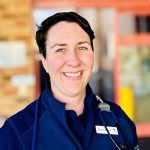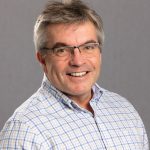Two Rural Generalists have put their hand up to become elected as the new ACRRM President for the next two years, with the voting period opening on Monday 5 August and closing on Monday 26 August.
Eligible members will receive how-to-vote information from the independent Australian Election Company.
GPRA – as the independent national peak voice for future GPs – spoke to both ACRRM candidates (Dr Emily Harrison and Dr Rod Martin) ahead of the voting period to give our Members an insight into each nominee.
GPRA would like to thank both candidates for sparing their valuable time to answer our questions, and we wish them luck in the ACRRM Presidential election.
Dr Emily Harrison

Dr Emily Harrison
What has motivated you to nominate to be President?
I had several friends and mentors in ACRRM who encouraged me to run for president. When they initially suggested I do so, I felt some imposter syndrome at the idea of taking on the role. However, after some self-reflection, I saw an excellent opportunity to contribute to the College.
I also hope to inspire others to raise their hands and participate in leadership positions within ACRRM and the broader medical community.
What is one thing you believe the College needs to do differently going forward?
I would like to see the College focus on building on the wonderful culture within ACRRM – to build a culture that is the envy of all other colleges, one that bolsters the flexibility and courage of its members, celebrates diversity, and encourages everyone to be their authentic selves.
We can do this because, with the establishment of college-led training, we have the influence to expand the education, training, and support for ACRRM registrars, supervisors, and fellows.
The college also has the power to advocate for clinician well-being and system change at all levels of government.
What do you see are the key issues impacting the future GP workforce?
This is a very complex issue, and I can only comment on my experience with the rural, remote and First Nations GP workforce.
The current funding structure of healthcare in Australia, combined with the consequences of the Medicare freeze and poor support clinicians working in rural, remote, and First Nations communities receive from metropolitan colleagues, have all resulted in significant stress and distress for the GPs, supervisors and registrars working in these communities.
Therefore, the attraction and retention of GPs, supervisors and registrars is challenging, as there is often no one left to encourage, support, or train the next generation of GPs.
You cannot be, what you cannot see.
What advice would you give a future GP?
Despite all the challenges of General Practice, it is the most rewarding aspect of my job.
Working in Primary Care allows me to develop relationships with patients that cannot occur in hospitals. I have opportunities to witness and help patients thrive through all stages of life.
You will never fully understand the impact you can have on patients’ lives working in General Practice. You will need to get comfortable with uncertainty; it is where you will sit most days, and that is ok.
Do you have any hidden talents we should know about?
I don’t have any hidden talents; all my talent is clear for all to see. I am good at crafting and often crochet during board meetings to keep myself focused. And I love baking, mainly because I love to eat baked goods.
What is one book you would recommend we all read?
This is a challenging one, as I have so many to recommend.
This is Going to Hurt and Undoctored by Adam Kay are two books I would recommend to all doctors. These books had me laughing and crying on the same page. They beautifully articulate not only the challenges facing doctors today but also many of the joys of the job.
For more information on the 2024 candidates for ACRRM President, visit the ACRRM website.
Dr Rod Martin
Dr Rod Martin
What has motivated you to nominate to be President?
I’ve played many roles within the College from the time I was a medical student. I have learned from many of the College leaders including Bruce Chater, who was my supervisor as a registrar in Theodore at the same time he was College President.
The momentum that ACRRM has now, especially as we have end-to-end influence and control over training and endpoint, is something that I am keen to continue at least, push harder at best.
I hope I have sufficient experience from my past, combined with guidance from my current registrars and intending trainees, to offer a good blend to the College and its members.
What is one thing you believe the College needs to do differently going forward?
We’ve done great things over 20 years despite plenty of hurdles. We’ve innovated and created, enabled by an overarching dynamic approach and willingness to take some risks.
We’ve been the lead in defining the Rural Generalist skillset and the responsibilities that go with it. We need to keep on adapting to a new generation of enthusiastic RGs and RGPs.
We must codesign the pathways towards Rural Generalist Specialty. We must share the wealth of stories that we have to support the burning need for true rural generalist medicine in this country.
What do you see are the key issues impacting the future GP workforce?
We are in somewhat of a race. We encourage working within scope of practice in all health fields but this should not amount to substitution. We have always believed that rural and remote care still needs to be coordinated by a rural and remote doctor. Governments are increasingly keen to implement role replacement without sufficient consideration, assessment and safety netting.
Similarly, the Rural Generalist must work to their full scope of practice and resist moves to constrain what we can do in our communities.
What advice would you give a future GP?
I would advise aspiring RGs and RGPs to be clear about where and how they want to work and be deliberate in mapping the best path to match it.
Most RG/RGPs are avid seekers of variety, novelty and are risk tolerant. They should maximise their exposure and training opportunities to prepare for the ‘why’ of RG.
I often tell RGs in training to be a little bit selfish – keep some time for themselves and create a habit/get a bit addicted to something that is not medicine, that they do on a regular basis.
Working in rural and remote is a big but rewarding commitment: professionally, personally and emotionally. Start building in the offsets early.
Do you have any hidden talents we should know about?
Talent … not so much, habit sure. I came away from the 2011 RMA Conference in Alice Springs having found my swimming mojo again. I now try to swim 4 days a week, but during COVID, with no pools to use, I started swimming in the local dam (down to 7°C). This has ended up in an (un)healthy interest in swimming in the cold and I completed a sanctioned Ice Mile (1,600m, <5°C) at Thredbo, 2 years ago.
What is one book you would recommend we all read?
Oldie but a goodie… How to Win Friends and Influence People by Dale Carnegie (originally 1936, Revision 1991).
A bit more recent but a little more difficult to explain – On Combat: The Psychology and Physiology of Deadly Conflict in War and Peace by Lt. Col. Dave Grossman and Loren W. Cristensen.
For more information on the 2024 candidates for ACRRM President, visit the ACRRM website.






